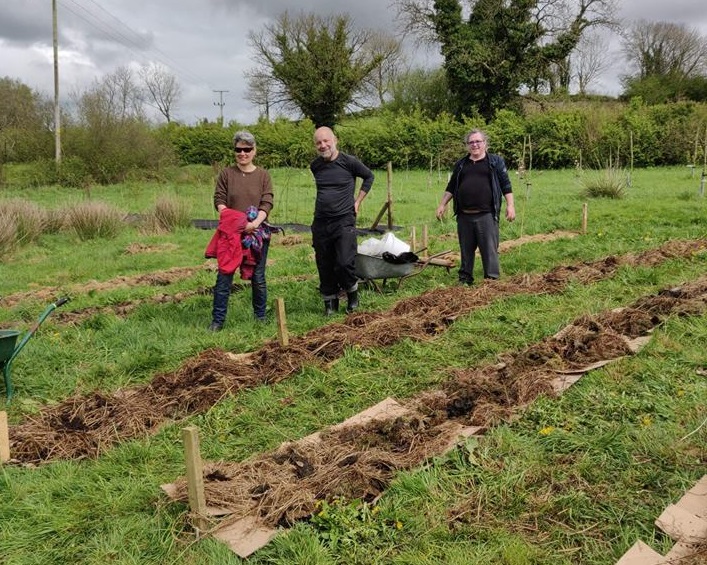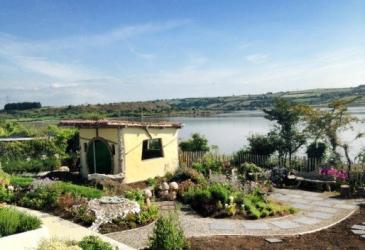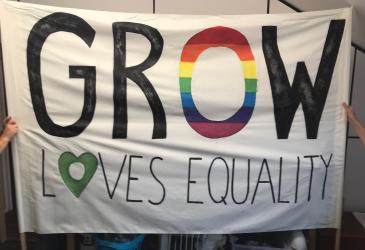Common Ground N.I. Nature Based Therapies

The 2020 spring programme includes two groups, Horticulture Therapy and Walking Ecotherapy. Both are relevant in the context of Social Farming and Community Gardens.
Geographical Area Covered
Fermanagh and Omagh District
Background
Common Ground N.I. has the mission of connecting individuals, groups and communities with nature for the benefit of humanity and for reciprocal benefits to nature. Participants experience change in their relationship to self, to nature and each other. The Case Study is drawn from part of our Community Services programme that includes Nature Based Therapies like Walking Ecotherapy and Horticulture Therapy. Recent groups have focussed on people with anxiety and depression. We have been developing this work (as innovative ways of doing therapy in nature as opposed to doing a therapeutic activity in nature) since 2016.
Referral process
We now have referrals from two GP practices in the area and from one Healthy Living Centre. There are two recently appointed social prescribers in the area. They work at each of the local Healthy Living Centres. We are confident that they will make referrals for the planned autumn programmes.
Individuals are told about our work by a health professional, GP or social prescriber. They are given a leaflet and if the person wishes to proceed the heath professional can make the referral through a dedicated page in the Common Ground N.I. website. Alternatively the person can use the self-referral page of the site. Anybody coming through that portal is assessed for suitability for the programmes by an initial discussion on the phone face-to-face assessment on site.
Promotion
The Nature Based Therapies are promoted through the website and linked social media – twitter and FB. Comprehensive leaflets and flyers are distributed to relevant individuals and organisations in the area.
Staffing
Horticulture Therapy is co-facilitated by a psychotherapist/ecotherapist and a community gardener; Walking Ecotherapy is co-facilitated by a psychotherapist/ecotherapist; the Spring 19 programme Walking-Talking-Making was co-facilitated by a psychotherapist/ecotherapist and a trainee art-therapist on placement.
The programme
Each programme is 12 weeks long – the groups meet weekly for a 3hr morning session and members also stay for a shared lunch. Participants are limited to a maximum of 8 and once formed in the first couple of sessions the group is closed so that a predictable, safe space can be nurtured. 2 professionals facilitate each group.
Horticulture Therapy includes – learning basic communication skills to encourage owning experience and authentic interactions, outdoor mindfulness, horticulture skills in a seed to plate programme, nature awareness and psychotherapeutic interventions. Walking Ecotherapy includes walking mindfully, outdoor mindfulness, nature awareness, communication skills, psychotherapeutic interventions and outdoor art therapy. The Spring 19 Walking Ecotherapy group involved collaboration with Belfast School of Art -Faculty of Arts, Humanities and Social Sciences -Ulster University. They provided a trainee MSc Art Therapy and we provided a placement position.
Challenges
There are two major challenges at this stage. The first is to get out of this cycle of repeat funding wherein there is no certainty about the next 12-week programme. We really need long-term contracts with a health trust. That would hopefully help with the second challenge, which is to offer a continuity program for those who complete a program.
The outcomes
Positive mental health outcomes that can be attributed to the projects are best understood by reading the feedback from participants. Extracts are expressed below.
Please describe if and how the horticulture programme has affected your general wellbeing?
“I have shed tears in front of people which I have never done before. I have realized emotion buried for decades and am learning to appreciate this is a positive. This seems to have allowed me to relax a little more than usual.”
“I became more conscious of the power of nature and my place in it. This forced me to stop trying to overthink and control everything.”
Please describe if and how the programme has affected your mental health?
“Made me become more aware of how important it is to actually do something to change my own view of myself.”
“I rely on Tuesdays to balance my stress city life. I come here in the morning & learn massage in the evening. Those help me to feel proper connection with nature and others. I feel less isolated and desperate. I can remember how to relax a bit more.”
Which aspects of the program have you taken into your daily life to help you manage your anxiety and depression?
“I take time every morning to get into my yard and check on the growing things. I try to use grounding techniques to deal with panic attacks. And when interaction with others is stressful of making me anxious or mull, I go to the nearest park or forest for a long walk.”
Please describe if and how the walking ecotherapy programme has affected your general wellbeing?
“I can hardly describe it but I feel lighter than I have for sometime and I’m less critical of myself generally. I feel more accepting and able to believe the words and feedback from others in the group and how they see me.”
“I’m sleeping better and feel like I’m not worrying as much.”
Please describe if and how the programme has affected your mental health?
“The program has helped me immensely. I had been holding on to negative self belief and anger for some time, it was hurting me but I was stuck. During the course of the program I felt something shifting me and I feel that my eyes and heart have been opened to a new beginning and kindness that I have not afforded myself in a long time.”
Friendships
A number of participants have formed new friendships on the programmes. Lasting bonds are formed when going through the deep therapeutic processes. We don’t make it our business to find out yet we are aware of a number of on going social relationships that were kindled at Common Ground.
Skills
A number of participants have started growing vegetables, herbs, fruit or flowers at home. Others have taken an allotment in the area.

Learning
We have been developing this work over 3 years and have worked through a number of challenges. We have developed an effective methodology to apply and fine tune as we go forward.
We would like to stress that the work of connecting people to nature as a therapy (as distinct to a therapeutic activity) is most effectively done by practitioners who themselves have developed deeply connected relationship with nature. We have also observed that much greater meaningfulness is achieved when the therapeutic process is inherently reciprocal with nature.
To end we offer some of the feedback from participants on the question of relationship with nature. This is at the heart of Common Ground and our stress on reciprocity. Indeed we would hold that a lot of individual and community malaise is due to our disconnection from nature. Sustainable behavioural/lifestyle change in terms of being reconnected takes time to integrate – time slowing down and just being oneself in nature, as evidenced by these quotes:
How has the Horticulture Therapy programme changed your perception of / or relationship with nature?
“Yes, I have started thinking more and more about nature and my place in it.”
“I have always enjoyed nature but in past 2 years I have withdrawn from “outdoors” somewhat so I feel really blessed to have found that part of me again and “outdoors” is once again like a big comfort blanket for me.”
“The programme has been part of my rediscovery of my need for access to nature and to play a role in ecology without which I lack authentic human experience. It has helped me strike a nourishing, holistic, Gaian balance with nature.”
“I feel one should be more respectful. You should treat the environment the same way you should treat yourself.”
“You look at nature a whole different way. Thus it helps you look at your inner self and see things differently. But the good, it helps you understand.”
How has the Walking Ecotherapy programme changed your perception of / or relationship with nature?
“I have rediscovered that the power of the natural environment cannot not be emphasised enough! My appreciation for nature and its therapeutic effects have been reawakened. It really is unbelievable.”
“100% increased my awareness appreciation and gratitude.”
“I appreciate who I am because of the beautiful things nature gives me every day.”
“I realise I am never alone.”
“It reminded me of how I felt as a child, and made me feel child-like again, just exploring and experiencing outside.”

Related Case Studies
Blossoms at Larne Lough specialises in using Nature-based Therapy to increase health & wellbeing and decrease stress. It is run from a purpose-built therapy garden on the shore of Larne Lough.
Grow was established by a small group of local residents from North Belfast in October 2008. Their motivation initially was to create a space for people to connect through growing, particularly targeting those who were experiencing mental ill-health. It quickly became clear however that there was interest and a need within the wider community for safe spaces to connect, not just those with mental ill-health.



